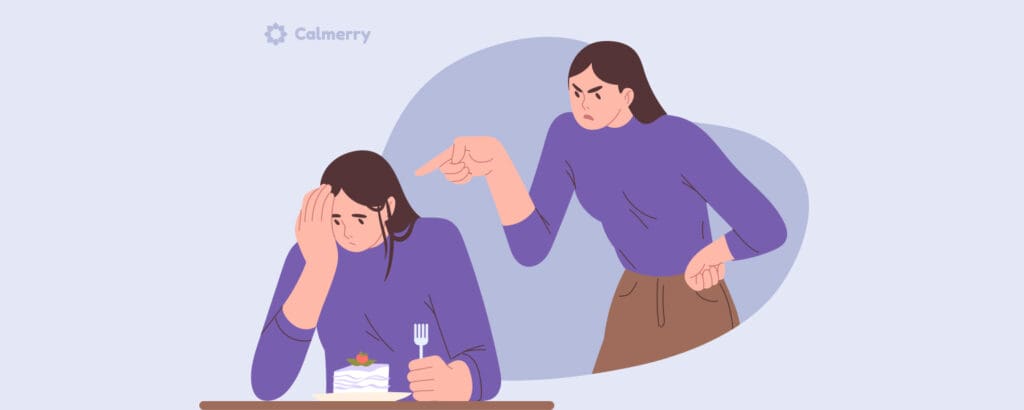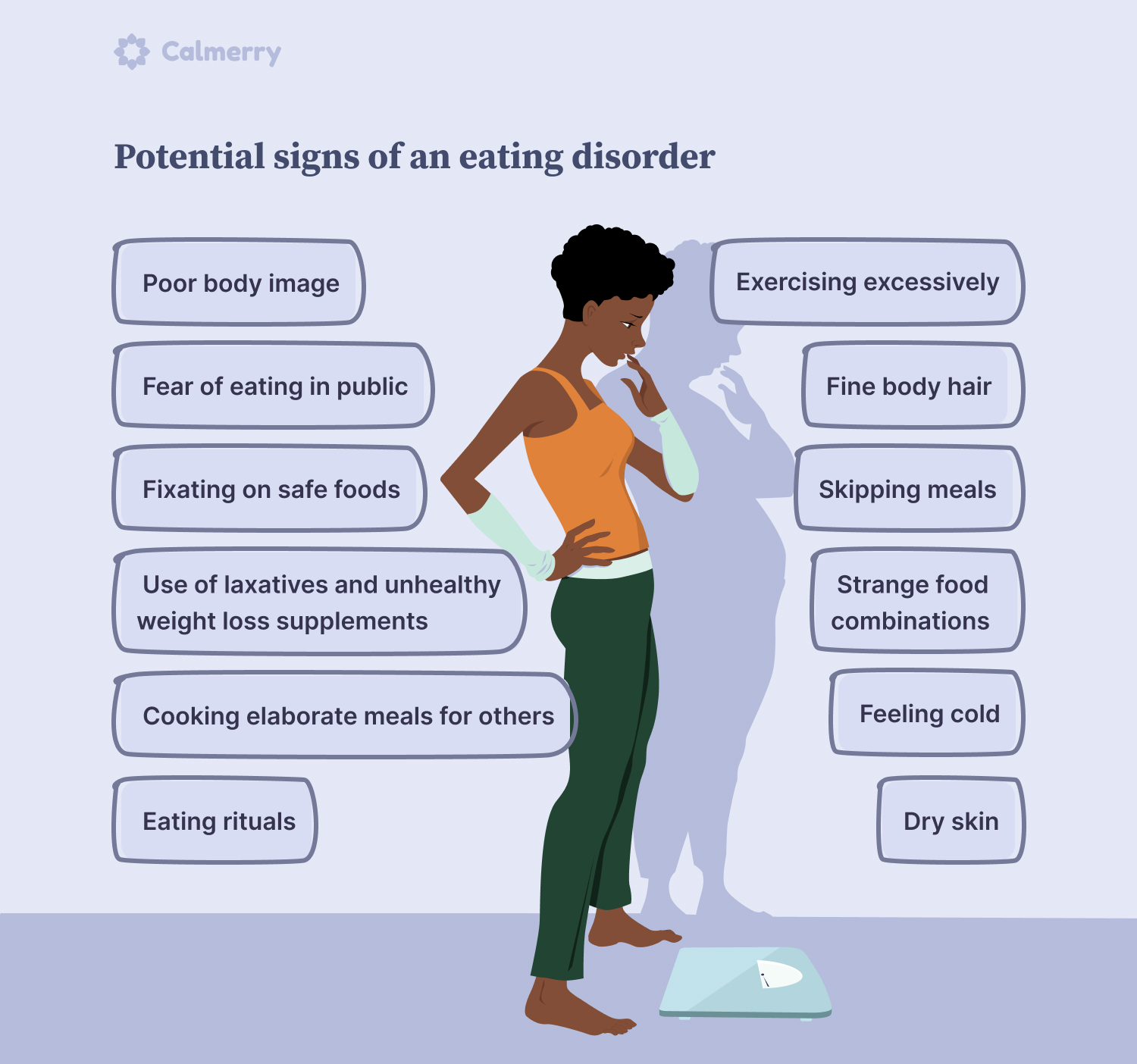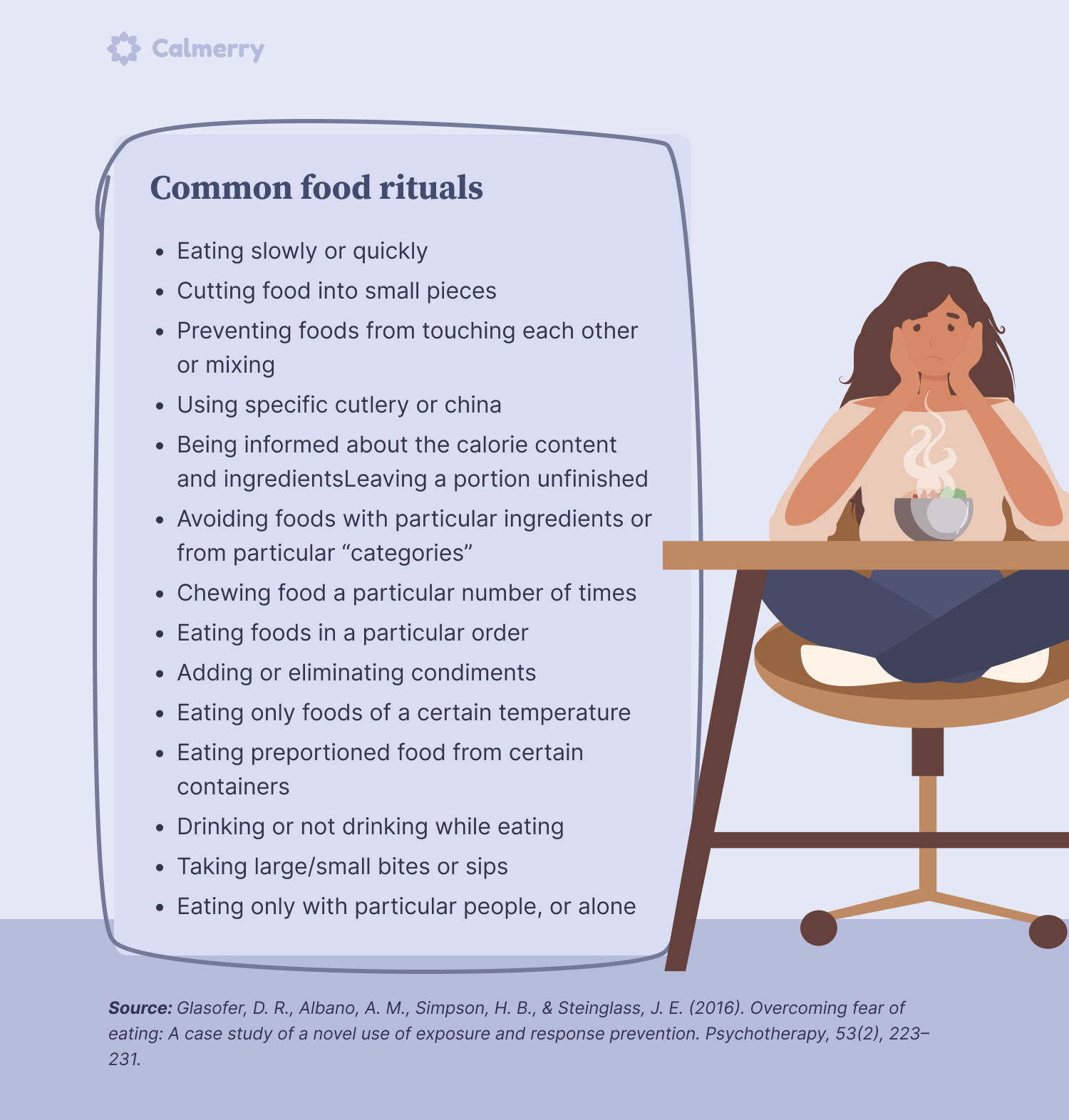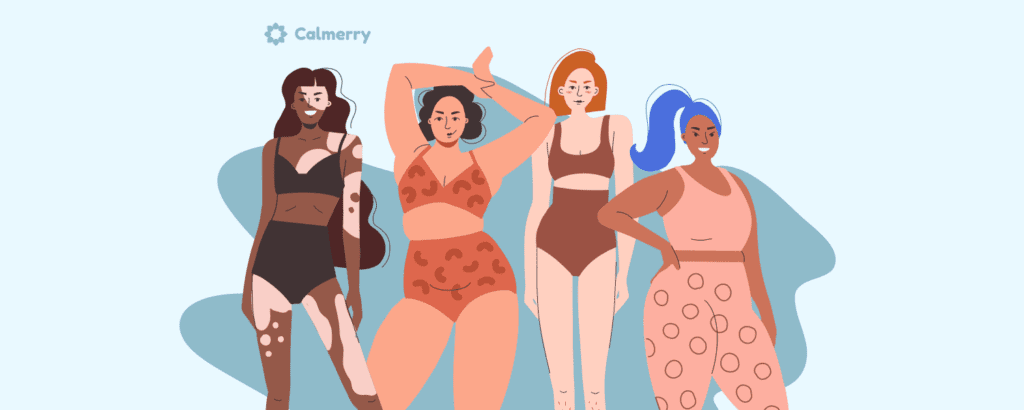12 Warning Signs of Eating Disorders You Shouldn’t Ignore

In this article
Eating disorders cover a wide range of mental health conditions that are characterized by unhealthy eating habits.
Although eating disorders are much more common in girls and women and tend to develop during the teenage and young adult years, they can affect people of any gender at any life stage.
The most common types of eating disorders are:
- Bulimia nervosa
- Binge eating disorder
- Anorexia nervosa
People with eating disorders tend to focus too much on their body weight and body shape and have unhealthy relationships with food. They use food to try to manage their feelings and cope with emotional pain.
If left untreated, eating disorders can lead to serious physical health problems such as low heart rate, slowed digestion, liver and kidney dysfunction, loss of menstrual periods, hair loss, and in severe cases, they can be life-threatening.
Talk therapy, also known as psychotherapy, plays a crucial role in addressing the underlying psychological factors contributing to these disorders and helping individuals develop healthier relationships with food and their bodies.
If you or a loved one are coping with an eating disorder, contact the helplines for support resources and treatment options.
Do I have an eating disorder?
What are the signs you have an eating disorder? Some symptoms of eating disorders are apparent, for example, refusing to eat or losing a lot of weight quickly.
But binge eating disorder, bulimia, and anorexia reveal themselves more subtly. And there’s a large percentage of people who struggle with symptoms that don’t entirely meet all the criteria of a problematic eating pattern.
As a result, some of the subtle warning signs of eating disorders can be easily overlooked, but recognizing the problem is the most important first step on the road to recovery and changing the future.
So, how can you tell if you or someone you care about is at risk? Here are some symptoms of eating disorders that can help you spot a problem even in the early stages.

1. Poor body image
One of the early signs of eating disorders is a poor body image, it includes negative self-talk like “I’m so fat” and misinterpreting other people’s remarks. If you’re constantly criticizing how your body looks even when you have a healthy body weight, that’s a red flag.
You may also find yourself comparing yourself to others who you believe look better.
2. Exercising excessively
If you find yourself exercising too much to get rid of calories and you panic if you miss a day of exercise, you should be concerned. This is a common habit among people with bulimia and anorexia.
If you have these disorders, you’ll find that you feel the need to exercise after eating because you’re afraid of gaining weight.
What’s more, you’ll go overboard because you believe that the more you exercise, the more calories you burn.
3. Fear of eating in public
Individuals with eating disorders also tend to avoid eating in public due to shame or eating very small amounts. It’s particularly common for binge eaters because they’re afraid of being judged. And when they are alone, they believe they can eat as much as they please without a care in the world.
However, this behavior is followed by feelings of guilt and shame. To deal with these emotions, the person purges to eliminate excessive calories and keep their weight in check.
4. Fine body hair
Your body will also show signs that unhealthy eating habits are affecting your health. Fine hair, known as lanugo, is a sign of nutritional deficiencies that are caused by eating disorders, for example, anorexia and bulimia.
Because these disorders involve restrictive calorie intake, a person will have insufficient body fat. Lanugo on arms and other body parts in adults is an attempt of the body to keep itself warm. It’s a symptom of starvation and shouldn’t be ignored.
5. Fixating on safe foods
If you tend to fixate on certain healthy or safe foods so that you don’t gain weight, that’s a cause for concern. It can be the symptom of a condition known as orthorexia, which is characterized by a pathological obsession with eating only healthy foods.
Such eating habits lead to complete avoidance of certain foods and may result in nutritional deficiencies. In most cases, people eliminate carbohydrates and fats from their diet because they believe these food groups cause weight gain.
It’s also not uncommon to find people who adopt an extremely restrictive diet to ensure they don’t gain weight in the process.
6. Skipping meals
The habit of constantly skipping meals with the hope of cutting back calories is also a red flag. Individuals who skip meals tend to binge and purge later in the day, which only makes matters worse. In the beginning, it may not seem like a big deal because you’re only skipping one meal a day.
However, it gets worse when people start noticing weight changes. They believe skipping meals works and they start skipping more.
7. Use of laxatives and unhealthy weight loss supplements
A poor body image and obsession with getting a perfect body may lead to unhealthy weight loss patterns. One of the signs of eating disorders is an over-reliance on laxatives and unhealthy weight loss supplements to keep one’s weight in check.
This habit is most common among binge eaters. They eat in excess and then use laxatives and supplements to get rid of the excess calories.
It’s also one of the common warning signs of bulimia and anorexia nervosa and is often accompanied by excessive exercise.
8. Cooking elaborate meals for others
People with anorexia are often afraid to eat. However, they don’t mind seeing other people eating. It’s a form of vicarious enjoyment, where they get to see others enjoy food because they believe they can’t.
As a result, they’ll tend to prepare elaborate meals for their family and friends even if they don’t plan to indulge. Furthermore, people with anorexia also tend to collect recipes and cookbooks.
9. Feeling cold
An individual suffering from anorexia nervosa will also tend to feel cold a lot. It is a result of malnutrition and low body fat. You’ll notice that the person tends to complain about being cold and they’ll prefer to wear heavy clothing even in mild weather.
You see, body fat is a source of energy that enables us to retain body heat and keep warm when it’s cold. When there is too little body fat, it’s difficult to maintain the body temperature, thereby causing a person to feel cold even when it’s not.
If the situation gets worse, the person may even develop hypothermia.
10. Dry skin
People with anorexia and bulimia also tend to have extremely dry and blotchy skin. This happens due to excessive purging and the use of laxatives that leave the body dehydrated.
However, the skin isn’t the only marker for dehydration in people with these disorders.
You will also notice your mouth is extremely dry, your cheeks are sunken, and you have an electrolyte imbalance. It’s also not uncommon for the knuckles to have scraped skin. This happens due to the repeated scraping of the hand against the teeth when one induces vomiting using their fingers.
11. Strange food combinations
This warning sign is common among binge eaters. You’ll notice that they tend to mix food ingredients in weird combinations that most people wouldn’t even think of trying. For instance, mixing mashed potatoes with Oreo cookies and other toppings.
The habit is often accompanied by feelings of shame, which lead to purging. As a result, the person will tend to eat all the strange foods that they can find and then force themselves to vomit so that they don’t gain weight.
12. Eating rituals
Another warning sign of an eating disorder is strange rituals during mealtime.
Some people are obsessed with arranging their food in certain patterns and cutting them into tiny slices, and they want to eat their food in a certain way. This is an early sign of anorexia or a binge eating disorder.

When to seek treatment
It’s challenging to overcome an eating disorder by using willpower alone – it’s important to reach out to a medical professional for help.
Treatment is tailored to each person and may include regular health checks with a physician, psychotherapy, and nutritional counseling.
Mental health professionals are involved in helping you rewire your perception of your body image and get to the root of the problem.
If you’re concerned about a loved one, you need to intervene before things get worse. Begin by addressing your concerns and talking to the person about them. Suggest getting medical treatment and referrals from mental health professionals who specialize in treating eating disorders.
Talk to a therapist on Calmerry
Online platforms like Calmerry provide accessible support and resources. You get a convenient way to connect with experienced therapists and nutritionists to start your journey toward recovery.
Start with a survey to get matched with your professional in 1 hour.
Wrapping up
It’s easy for signs of eating disorders to go unnoticed, especially during the early stages. However, it’s crucial to watch your eating habits and those of your loved ones if you suspect an eating disorder.
Don’t wait until they’re showing all the signs because it may lead to serious long-term health consequences.
Seek help from a healthcare professional with expertise in treating eating disorders immediately. Eating disorders are treatable, and although recovery can take a long time, most people can learn healthy eating habits.
online therapy
live video session


